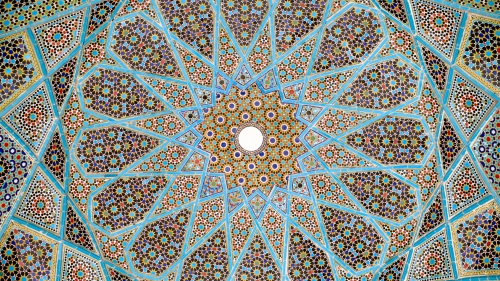Has Hollywood Gone Soft on Muslims?
Scene One:
A devout Pakistani man coolly ignores the abuse heaped upon him by a vulgar European colleague to complete his obligatory prayers before resuming a perilous mountain ascent. The young Muslim's compassion and civility are on display throughout the tale of high altitude heroism and represent a true moral high-point in the story.
| ______
Over the years, the American entertainment industry has churned out a seemingly endless stream of offensive films demonizing Arabs and Muslims as filthy, chauvinistic, sex-driven, and violent thugs, an affront to modern civilization. _________ |
Scene Two:
A jovial, peaceful Imam shepherds a flock of Muslims on an intergalactic journey to perform the annual Islamic pilgrimage, or Hajj. The Imam's faith and conviction never waver despite the horrific encounters that ensue once the space ship carrying the Muslims and other passengers crash lands on an unknown planet.
Scene Three:
Against overwhelming odds, a heroic, medieval Arab nobleman and a rag-tag band of Viking warriors battle a sinister band of prehistoric cave dwellers terrorizing the local Scandinavian population.
What do these three vignettes have in common? They represent actual plot lines from three mainstream Hollywood films released over the past two years. The films in question are titled "Vertical Limit", "Pitch Black", and "The 13th Warrior". Remarkably, the three flicks fall under the genres of action-adventure or science fiction, not exactly the categories one would expect to encounter sensitive portrayals of frequently misrepresented communities. An American Muslim can only wonder: has Hollywood suddenly gone soft on Muslims?
The answer, of course, is no, but the release of these three movies should be applauded by Muslims and fair-minded citizens for departing from common themes and stereotypes to present accurate or at least positive images of the community.
Hollywood has never been kind to Islam or the Arab world. Over the years, the American entertainment industry has churned out a seemingly endless stream of offensive films demonizing Arabs and Muslims as filthy, chauvinistic, sex-driven, and violent thugs, an affront to modern civilization. Moreover, in the wake of the horrific events of September 11, American Muslims may soon face a new wave of terror flicks at their local movie theaters.
The generally positive characterizations cited above represent a mere drop in the celluloid bucket, where Muslim and Arab villains are a dime a dozen. Muslims are certainly not the first minority group to encounter harmful stereotyping at the hands of the entertainment mythmakers.What separates this community from others, however, is the general absence of any positive film images to balance the barrage of repetitive, negative images confronting moviegoers annually on the silver screen. As Arab American activist and radio/television personality Casey Kasem points out, Arabs (and by extension, Muslims) are seen as bombers, belly dancers, and terrorists. Even in films set in the United States, we are rarely depicted as friends, neighbors or simply common people, part of the enduring fabric of American society.
In the recently released "Reel Bad Arabs: How Hollywood Vilifies a People", Dr. Jack Shaheen, Professor Emeritus of Mass Communications at Southern Illinois University, analyzes from A-Z over 900 films released between 1896 and 2001 involving Arab characters or themes. The overwhelming majority of films cited depict Arabs or Muslims in an unflattering light. The list is exhaustive, and it conveys a sobering reality: entire generations of film watchers have been reared on these vile, scandalous depictions of Arabs and Muslims.
While entertainment is the name of the game in the entertainment industry, motion pictures have been employed for other purposes as well. The vast potential of the film industry was affirmed by Nazi propagandists in Germany in the 1930's, who recognized the inherent, fundamental value of the new medium and incorporated it in their efforts to espouse the concept of a superior Aryan race. A decade later, during World War II, the U.S. government commissioned the film industry in Hollywood and prominent actors in the effort to boost public and troop morale.
For Muslims and Arabs, the notorious example of the Cannon Film Corporation in the 1980's is instructive.Israeli filmmakers Menahem Golan and Yoram Globus, who in 1982 was appointed director of Israel's film industry department, formed the company in the United States. According to Professor Shaheen, Cannon produced over 25 movies with anti-Arab themes, often multiple variations on the theme of killing evil Palestinians/Arabs. Indeed, it's not all wholesome, harmless entertainment.
American Muslims, even those who shun the film experience altogether should be alarmed. Motion pictures represent a powerful medium for the transmission of opinions and cultural values. In today's disposable, image-obsessed culture, movies are modern bedtime stories, mythology, and visual literature, all rolled into one. The images encountered on the silver screen can leave lasting impressions, particularly on young minds with limited exposure to Muslims or Arabs to counter the images.
The relentless depiction of Muslims and Arabs as hostile, brutal, vulgar villains should trouble our community as much as our perceived lack of political clout. Today, Americans are bombarded on a nightly basis with images of Osama bin Laden calling for jihad. The television and radio airwaves are flooded with pundits and politicians declaring a "clash of civilizations" and the inherent incompatibility of Islam and the modern world. In the current climate, balanced screen portrayals of Muslims assumes an even greater importance.
American Muslims should make the effort to recognize those rare films that depict Muslims in a positive light, whether these portrayals are the result of the community's increasing activism, or merely a greater familiarity on the part of society at large with Islamic beliefs and practices. Phone calls to industry executives and letter/e-mail campaigns to movie production companies should be standard practice. Both positive and negative portrayals should be recognized. American Muslims should also initiate an aggressive, organized campaign to educate the film community regarding Islam and the Muslim world.This approach should parallel the ongoing efforts to update and correct school textbooks and promote political inclusiveness.
Although many Muslims may find the values and mores depicted by the motion picture industry offensive, we cannot expect Hollywood films, which are conceived and produced by individuals from various backgrounds holding different sets of values, to conform precisely to Islamic precept,s. At the least, however, we should strive to encourage positive portrayals of Muslims. And we should never abandon the opportunity to inform and educate. ,In the aftermath of September 11, the stakes are simply too high.
___________________________________________
Basil Abdelkarim is a physician and research associate for American Muslims for Jerusalem.
















